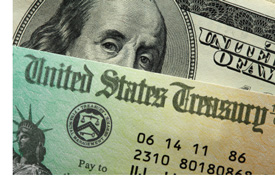A Bigger Tax Refund Check is Not Always Better
 You don’t have to do anything and yet you get a large check in the mail. Sounds like a great deal doesn’t it? In fact, it may sound so great that you do it every year; you have more taxes withheld from your paycheck than you need to, resulting in a refund check for the amount you overpaid. You may do it because: You don’t have to do anything and yet you get a large check in the mail. Sounds like a great deal doesn’t it? In fact, it may sound so great that you do it every year; you have more taxes withheld from your paycheck than you need to, resulting in a refund check for the amount you overpaid. You may do it because:
- It’s a forced savings account because you can’t access the money
- You use the money to pay off debts accumulated during the year
- You use the money to treat yourself for a year of hard work
On top of that, it just feels good to get a big check in the mail – even though it is actually your own money. But this endorphin rush often masks a sad truth: getting a large refund means missing opportunities to move closer to your goals and better yourself financially throughout the year.
If you put $200 dollars per month on a credit card with 20% interest and then made the minimum payments each month until getting a $2,400 tax refund, you would pay $2,725 over the course of a year to get $2,400 worth of goods and services. If you had instead gotten no tax return and received more money in take-home pay each month, you would have an extra $325 to put toward an emergency fund, a down payment on a new home, a treat, or any other financial goal you may have.
Using tax overpayment as a savings system may help you set aside money for a later date, but this is money you cannot access even if you need it for an emergency since the federal government prevents withdrawing it early. If the idea behind tax overpayment is to treat yourself, you would reap even more of a reward by opening up a savings account or a CD so the money can gain interest and you’ll have even more money to put toward your goal.
Since we know overpaying taxes is not the best way to go, how do you figure out what you should have taken out of each paycheck? After all, having too much taken out isn’t the only potential problem. If you underpay, you could end up with a big unexpected tax bill with penalties tacked on.
How much should you be withholding?
The more allowances you claim, the less money from your paycheck goes to taxes, and vice versa. If you get a large tax return, you should consider increasing your allowances.
You can use the IRS’s withholding calculator to figure out the right number of allowances for you.
How do you adjust your allowances?
You can find the W-4 form on the IRS’s website. Once you have completed the form, give it to your employer or your HR department for processing. To find out your state tax withholdings rules and regulations, contact your state’s tax agency.
Is this a “fix it and forget it” kind of thing?
Not necessarily. If you have a significant life change like getting a raise, changing your marital status, or buying a house, you will want to visit the IRS’s website again to check any effect to your tax liability. A tax professional can help you with any specific questions you may have on your tax situation.
The bottom line
You may have conditioned yourself to look forward to the excitement of a large tax refund check in the mail each spring. However, with more money from each paycheck going into interest-bearing accounts, you actually have the ability to reach your goals faster by not getting that tax refund. Combining your extra money each month with a sound budget will have you moving toward your financial dreams in a much more effective way. |



